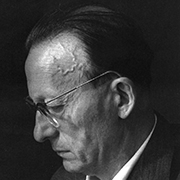Miloslav Kabeláč is one of the most important Czech composers of the 20th century. He can indisputably be described as the greatest symphonist of the generation after Bohuslav Martinů.
Miloslav Kabeláč (1 August 1908 – 17 September 1979) is one of the most important Czech composers of the twentieth century. The mainstay of his compositional oeuvre comprises a monumental series of eight Symphonys (1942–1970), which are supported by several other orchestral works from the period after World War II: Mysterium času (The Mystery of Time; 1957), Hamletovská improvizace (An Improvisation on Hamlet; 1963), Zrcadlení (Mirroring; 1968).
Kabeláč was perfectly equipped for a successful symphonic career: his creative spirit is inclined to a gravity of content in his works, to structures and ideas of monumental or monumentalist proportions. On the other hand, his compositional approach exhibits a detailed and well-reasoned design in each of his works, a clean and well-balanced use of expressive means, and a search for new methods of composition, both through experiment and through the contemporisation of those elements of music and composition that had been previously either disregarded or only marginally – and often inadequately – used by European music: elements of non-European musical cultures.
In the early 1940s Kabeláč reached a stable point in the basic parameters of his musical language by anchoring them in the landscape of modern modality, similarly to the likes of Bartók, Messiaen, or later also Lutosławski, who maintained friendly contact with the Czech composer. Kabeláč created a system of modal structures, which he termed “artificial tonalities” and which he continued to use for the rest of his life. Another characteristic mark of his creative expression is the endeavour to maintain a balance between spontaneous intuitive creativity and rational reasoning. Kabeláč was a multi-talented individual with theoretical, historical, and ethnomusicological insight. He also had a remarkable understanding of mathematics and technology. Kabeláč’s musical language is modal in the broadest sense of the word: the composer uses diversely organised tone rows, which he not only treats as melodic and chordal material but also applies in the form of derived numerical ratios to further parameters of his musical language – rhythmometry, timbre, and even form.
Kabeláč never quite abandons tonality, albeit a very broadly defined tonality. His melodics is austere, he prefers mainly second steps, or at most minor-third skips. His works are imbued with the contemporised techniques of heterophony and early polyphony, as well as with the refined approach of Renaissance polyphony with all its multifarious inversions, imitations, augmentations, and diminutions. As the very first Czech composer to do so, Kabeláč also began enriching his compositions with elements of Indian and Japanese music, or even with such types as the music of the Polynesian cultural sphere (the pentatonic “Lamentation” from New Guinea in Symphony No. 7). In his later Symphonys he also makes unconventional use of Biblical texts. Symphony No. 8 “Antifony” (“Antiphons”; 1969–70) represents the culmination of Kabeláč’s innovative methods within the traditional framework of the symphony: it has nine parts – five movements interspaced with four intermedia, the instrumentation consists of a large group of percussions, an organ, and a large mixed choir with solo coloratura soprano.
The orchestral works of Miloslav Kabeláč are among the best of Czech music of the 1950s and 60s, and he can easily be described as the greatest symphonist of the generation following Bohuslav Martinů. His oeuvre, which had been stifled for many decades, is finally finding its way on to the international stage: audiences are introduced to The Mystery of Time by conductor Jakub Hrůša on his various travels around the world. Conductor Marko Ivanovič has recorded the complete set of Kabeláč’s Symphonys together with the Prague Radio Symphony Orchestra.
Jaromír Havlík
(Translated by Adam Prentis)
(from [t]akte 2/2015)
A few words on Kabeláč by conductor Jakub Hrůša:
“The works of Miloslav Kabeláč have been to me something of the ideal of a modern musician’s momentous creativity. He was a composer who was able to work in a strictly, even ascetically (archi)tectonic way, but always with an extraordinary emotional impact on the audience. It is a small big miracle: Kabeláč never ingratiates himself, and yet he always astounds, captivates, and penetrates to the depth of the human soul. What I love about him is his purity of style and his courage to always be true to the distinctive, yet fully intelligible concept of composition, which he set out for himself regardless of the fashions and pressures of the times. Kabeláč is, for me, a moral authority in the artistic sense.”



